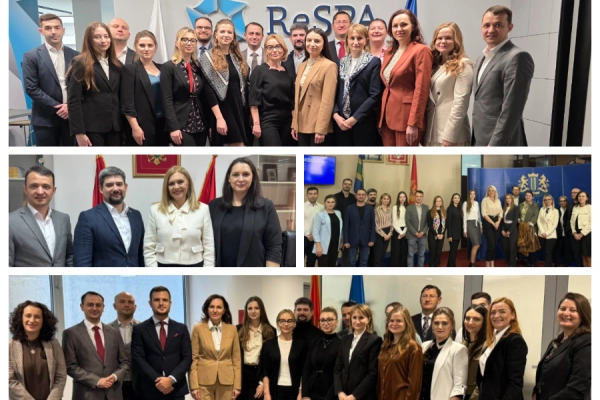
ReSPA Bridges Moldova and the Western Balkans: Strengthening EU Accession Expertise through Regional Cooperation
3–6 November 2025, Podgorica, Montenegro
In a powerful demonstration of regional collaboration and knowledge exchange, the ReSPA, in cooperation with GIZ Moldova, the Ministry of Justice of the Republic of Moldova, the Ministry of Internal Affairs of the Republic of Moldova, and the State Chancellery of Moldova, successfully organised an Executive Training and Study Visit in Montenegro for 15 Moldovan civil servants.
This initiative is part of a broader effort to strengthen regional cooperation and knowledge exchange among the Western Balkans, the Eastern Partnership countries, and the European Union.
The programme offered participants an in-depth understanding of the EU accession process, combining expert-led sessions, institutional visits, and peer-to-peer exchanges. By engaging directly with Montenegrin institutions and seasoned experts, Moldovan civil servants explored the institutional, legal, and policy frameworks necessary to align national systems with EU standards.
On Day 1, at ReSPA premises, participants explored the geopolitical dynamics of EU enlargement and its impact on the Western Balkans. Genti Xhaxhiu, ReSPA Programme Coordinator, led discussions on regional cooperation and its implications for EU accession, while Jelisaveta Tasev and Boris Ristović, ReSPA Programme Managers, detailed the negotiation processes, techniques, and progress in the region.
Csaba Törő, EU Integration Advisor to Montenegro at the Hungarian Ministry of Foreign Affairs and Trade, shared Montenegro’s experience in Chapters 23 and 24, providing insights into the practical challenges of alignment and legislative reforms. The day concluded with a conversation led by Gordana Đurović, ReSPA Expert, highlighting how national reforms contribute to a regional vision for EU integration.
Day 2 focused on Montenegro’s institutional and strategic frameworks for EU accession. Participants visited the Ministry of European Affairs, Ministry of Justice and the Ministry of Interior where the Moldova’s delegation gained first hand knowledge or milestone achievements by Predrag Zenović, Chief Negotiator of Montenegro with the EU, Svetlana Rajković, Head od Division for EU Political Affairs and Deputy Head of the Negotiating Working Group for Chapter 23, Jelena Grdnić, Head of the Negotiating Working Group for Chapter 23, Vesna Moračanin, Deputy Head of the Negotiating Working Group for Chapter 24.
Day 3 offered insights into IPA funding and coordination of financial and technical assistance, as well as the critical alignment with the EU acquis. Peer-to-peer sessions included exchanges with civil servants from the Western Balkans: Milica Abramović, Head of Department for National IPA programme, MEA; Dubravka Jovanović, Independent Advisor in National IPA Programmes; Obren Tijanić, Independent Advisor in the Unit of Harmonisation, Adnan Tatar from the Office of the FBiH Government for European Integration, Miodrag Lazić, Deputy Head of the Negotiation Group for Chapter 24 in Serbia, and Darija Ramljak, Assistant Director of the Directorate for EU Integration in Bosnia and Herzegovina. These sessions reinforced the importance of shared learning across the region.
Peer-to-peer exchange with Miodrag Lazić, Deputy Head of Negotiation Group for Chapter 24 and Member of Negotiation Group for Chapter 23, Ministry of the Interior of the Republic of Serbia, as well as other participants from the Western Balkans, provided Moldova’s delegation with hands-on insights and practical guidance on their path to the EU.
On Day 4, the participants visited the Municipality of Bar, exploring the role of local authorities in the EU accession process and the effective use of EU funds for local development and cross-border cooperation. Ana Živanović, Head of the Project Management Department, led the discussions.
This Executive Training exemplifies ReSPA’s pivotal role in connecting the Western Balkans, Eastern Partnership countries, and EU institutions, fostering a shared European administrative space grounded in cooperation, mutual learning, and practical knowledge exchange. The programme not only strengthens Moldova’s preparations for EU accession but also reinforces regional partnerships essential for stability, resilience, and prosperity across Europe.
This activity was carried out within the framework of the European Union Integration Support Project, funded by the German Federal Foreign Office and implemented by GIZ Moldova, underscoring the shared European commitment to cooperation and mutual learning on the path to EU membership.



